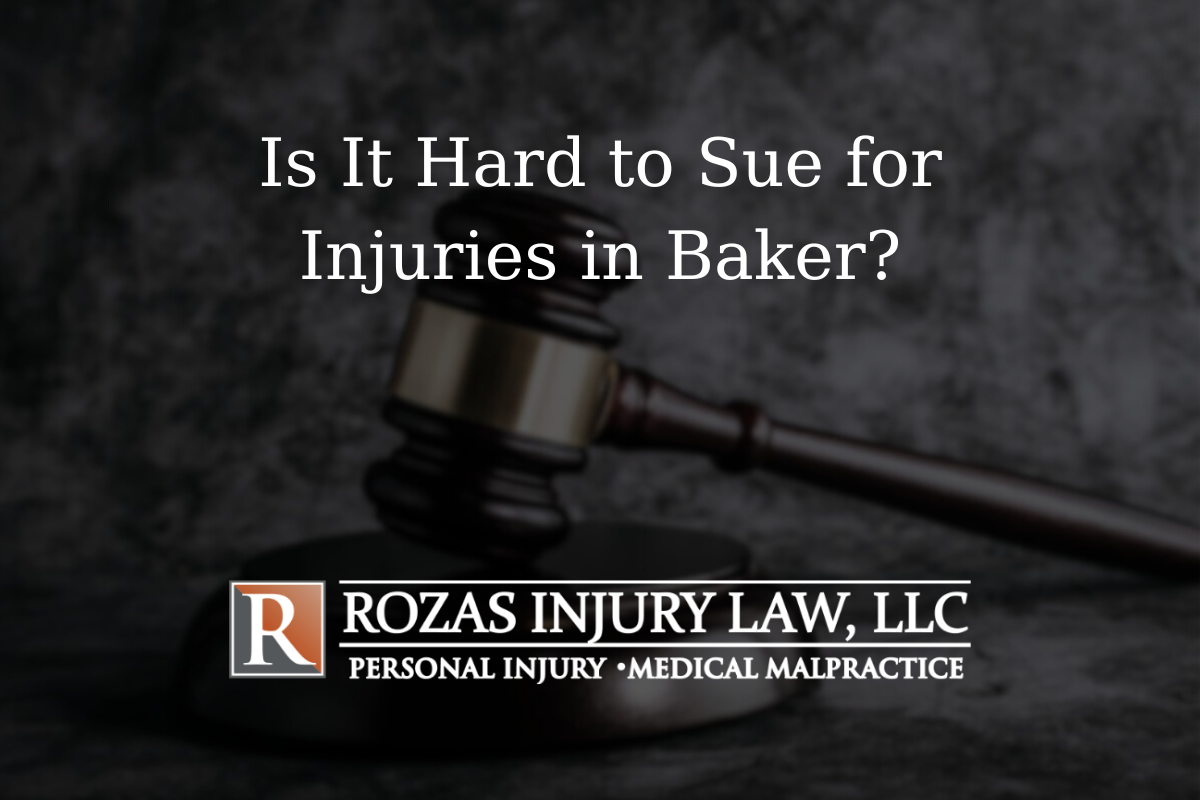Navigating the aftermath of a wrongful Baker Act detention in Florida can be overwhelming and traumatic. The Baker Act, designed to protect those experiencing mental health crises, can unfortunately be misapplied. When this happens, it can result in real harm—physically, emotionally, and financially. If you or a loved one has been wrongfully Baker Acted in Baker County or the surrounding area, you may be wondering: Is it hard to sue? While the legal process is complex, it’s not impossible—especially with the guidance of an experienced attorney.
Rozas Injury Law, LLC is committed to helping injury survivors in Louisiana—and those affected by wrongful detentions—understand their legal rights and pursue justice. This blog breaks down the key considerations in filing a lawsuit after being wrongfully detained under the Baker Act.

What Is the Baker Act?
The Baker Act is a Florida law that allows for involuntary psychiatric examination of individuals suspected to be mentally ill and a danger to themselves or others. This can be initiated by police officers, judges, or medical professionals, and it typically leads to a 72-hour hold in a designated facility for evaluation.
However, misinterpretations or misapplications of this law can lead to serious consequences. Someone who was wrongfully Baker Acted may suffer not only emotional trauma but also physical injuries, missed work, social stigma, and financial burdens due to medical bills and treatment costs.
When Is a Baker Act Detention Considered Wrongful?
A Baker Act detention may be considered wrongful or unlawful if:
- The individual was not a danger to themselves or others.
- There was insufficient evidence to justify the hold.
- The detention was based on incorrect or falsified medical records.
- Procedural errors occurred during the detention process.
- The facility or medical professionals acted negligently or maliciously.
Wrongful detentions can result in significant emotional distress and other injuries, such as if the individual was physically harmed while in custody or experienced sexual assault or neglect in the facility.
What Makes Suing Difficult?
Suing for wrongful Baker Act detention in Baker—or anywhere in Florida—can be legally challenging for several reasons:
1. Complex Legal Process
The legal process involves filing a formal complaint, undergoing discovery, responding to motions, and possibly going to court. Each of these steps requires familiarity with the legal system and extensive documentation.
2. Qualified Immunity
Certain officials, like police or state employees, may have legal protections known as qualified immunity, which can complicate your case. However, these protections are not absolute, especially if your attorney can show the officials acted outside the law or without just cause.
3. Insufficient Evidence
Many wrongful detentions suffer from a lack of clear documentation, making it difficult to build a strong case. Preserving all evidence, including police reports, facility logs, and medical records, is essential to success.
4. Emotional Burden
The process of suing after a traumatic incident like wrongful psychiatric detention can be emotionally taxing. This is where having an experienced attorney becomes crucial—not just legally, but emotionally.
How an Experienced Attorney Can Help
An attorney with experience in wrongful Baker Act detentions and personal injury claims will know how to:
- Identify all responsible parties, including the facility, law enforcement, and individual medical professionals.
- File and develop a strong case, using witness testimony, expert evaluations, and medical evidence.
- Consult with experts in psychiatry or law enforcement procedures to challenge false claims or misapplied laws.
- Address issues of emotional trauma, broken bones, or other injuries caused during detention.
- Seek compensation for medical bills, lost wages, and other damages.

What Compensation Can You Pursue?
If your injury claim is successful, you may recover damages for:
- Medical costs related to the detention and any injuries.
- Lost wages or job impacts from the detention.
- Emotional trauma, psychological treatment, and related expenses.
- Physical injuries, such as if you were hurt during transport or restrained improperly.
- Pain and suffering and other non-economic losses.
Local Insight: Baker County Considerations
Baker County, like the rest of Florida, follows the state’s Baker Act procedures—but facilities and professionals in the area may vary in their application of the law. If you believe your rights were violated in Baker, understanding local practices, legal precedents, and available resources is essential. Local attorneys are better equipped to handle jurisdictional nuances and are familiar with area-specific procedures.
Learn more about suing for injuries in Baker. Call Rozas Injury Law, LLC at (225) 343-0010 to schedule your free, no-obligation consultation. You can also reach us anytime through our contact page. Let us help you take the first step toward justice and recovery.
What Factors Make It Difficult to Prove Negligence in Personal Injury Cases in Baker?
Proving negligence in personal injury cases in Baker requires clear evidence linking the defendant’s actions to the injury. Factors such as lack of eyewitness accounts, unclear causation, and differing interpretations of events complicate the legal framework. Additionally, insurance company tactics can hinder the process, making it challenging for plaintiffs to succeed.
FAQs: Suing After a Wrongful Baker Act Detention in Baker
1. Can I sue a facility for wrongfully Baker Acting me?
Yes, if the facility acted without proper legal grounds or violated procedures, they may be held liable in a personal injury lawsuit.
2. What if I was physically injured during the detention?
You can include those injuries in your claim, especially if they resulted from negligence, abuse, or improper restraint techniques.
3. What evidence do I need for my injury claim?
Medical records, witness accounts, facility documentation, and police reports are crucial pieces of evidence.
4. How long do I have to file a lawsuit?
Personal injury claims have a statute of limitations. Florida now applies a 2-year statute of limitations for personal injury claims under state law (per HB 837, effective March 2023). However, civil rights claims under federal law, such as wrongful detention or abuse under the Baker Act, may have up to 4 years to file. Consult a lawyer to confirm the applicable deadline in your case.
5. Can I sue if a loved one was wrongfully Baker Acted?
Yes, especially if you are their legal guardian or representative. The legal process allows claims for injuries suffered by a loved one due to wrongful detention.




